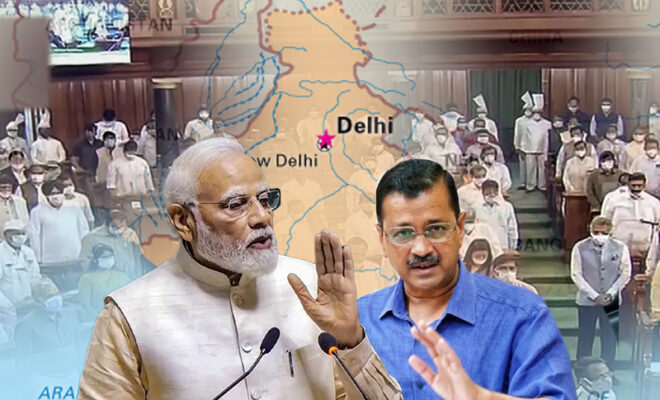Delhi Services Bill: What does it mean for employees?

Questions have been raised regarding the effects of the Government of National Capital Territory of Delhi (Amendment) Ordinance, 2023 on the authority of the elected Delhi government and the function of the Lieutenant Governor (LG). The Delhi government was permitted to enact laws and manage civil services in the nation’s capital by the Supreme Court in its ruling on May 11. It limited the LG’s authority to three particular domains: public order, law enforcement, and land.
The court attempted to strike a balance between the elected Delhi government’s ability to govern successfully through “professional” civil service officers and the national interests of the Centre in the capital. The Government of National Capital Territory of Delhi (Amendment) Ordinance, published on May 19, was the Center’s response to the ruling.
This Ordinance claims to strike a balance between the local and domestic interests of Delhi’s residents and the democratic will represented by the President of India to establish a comprehensive administration scheme for services. The Ordinance has sparked discussions about Delhi’s future governance and the division of powers.
The Aam Aadmi Party’s (AAM) opposition to the Bill, which undermines a Supreme Court order granting the Delhi government executive powers in service matters, including officer transfers and postings, has received the support of all parties in the INDIA coalition. The Union Cabinet approved replacing the ordinance, and all parties have expressed their support for the AAM’s (AAM) opposition to the Bill. The BRS, which is not a member of the INDIA coalition, lends support to the opposition’s position, but the maths in the Upper House still favors the government. For the next three days, it is required that every BRS member be present in the House.
What is stated in the Ordinance?
The use of the Ordinance by the government can be traced back to its stance on May 21, 2015, when a Home Ministry notification gave the Lieutenant Governor (LG) control over services, igniting the long-running dispute between the Aam Aadmi Party (AAP) government and the Centre. The notification restricted the Delhi government’s authority over State List Entry 41 (services).
The National Capital Civil Service Authority (NCCSA) is now created by the Ordinance, with the Chief Minister serving as chairperson and the Chief Secretary and Principal Home Secretary serving as members. Except for public order, police, and land, all Delhi government departments’ civil service employees are subject to the NCCSA’s authority. Transfers, postings, disciplinary actions, and other issues are decided by it, with the LG having the final say in the event of a tie.
In contrast to the Supreme Court’s vision of a “neutral civil service” carrying out the decisions of the Council of Ministers, the creation of the NCCSA raises concerns about bureaucrats potentially having veto power over the Chief Minister. The NCCSA distances civil service officers from the administrative control of elected Ministers, undermining the collective responsibility and government accountability emphasized in the judgment.
The President’s Transaction of Business Rules of the Government of National Capital Territory of Delhi, 1993, which emphasize the executive powers of the Delhi government, headed by the Council of Ministers with the Chief Minister at its head, are also disregarded by the Ordinance.
The Ordinance also disregards the court’s rejection of the K Balakrishnan Committee’s recommendation that “services” are not covered by NCTD. The committee’s report, which addresses Delhi’s governance structure and was included before Article 239AA of the 69th Constitution Amendment, 1991, was added, was categorically rejected by the court as being irrelevant.
Ordinance versus SC decision: Conflicting interpretations
The main defense of the Ordinance is based on the Supreme Court’s recognition of Parliament’s superior legislative power over the national capital. The Centre argues in a review petition that Delhi is not a “full-fledged State” but rather an extension of the Union Territory, making Parliament its true legislature.
Although Delhi is not a State under the First Schedule to the Constitution, the May 11 judgment challenges this assertion by recognizing that its Legislative Assembly has the constitutional authority to enact laws on matters listed in the State List and Concurrent List, even though Delhi is not a State under the First Schedule.
The unanimous decision recognizes that Delhi, as the National Capital Territory of Delhi (NCTD), has the legislative authority to satisfy its citizens’ aspirations. Article 239AA(3) gives NCTD a small amount of legislative authority, comparable to that of States, with a democratically elected government answerable to the residents of NCTD. With the Union of India at its core and NCTD serving as a regional organization, this creates an “asymmetric federal model.“
The May 11 ruling cited a 2018 Constitution Bench ruling that upheld applying federalism principles to NCTD even though it did not grant it statehood.
In its ruling, the court emphasized that the Delhi government’s legislative and executive branches have equal authority over all matters, including services, except for public order, police, and land, which are the purview of the legislative branch.
Also Read:- “When They Return From Manipur…”: Dare BJP To Meet Opposition MPs
Focus on LG’s abilities
The Ordinance has effectively put the LG back in charge by restoring his authority and giving him the final say on any decisions made by the NCCSA regarding services. This action is taken despite a 2018 ruling by the Constitution Bench restricting the LG’s authority.
In its ruling on May 11, the court agreed with its conclusions from the previous year, stating that the LG must abide by Article 239AA(4) while exercising its executive authority over matters that fall under the purview of the NCTD’s legislative assembly’s legislative authority.
Even the “limited discretionary power” granted to the LG, the court emphasized, should be used wisely and only in exceptional cases involving national interest and finances. According to the ruling, the LG is not permitted to refer every issue to the President.



